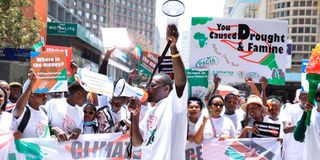There’s need for adaptation research to inform policy in Africa

Climate activists under the Pan African Climate Justice march on Kimathi Street, Nairobi, on October 13, 2022.
What you need to know:
- The expectation of Africa at the COP27 is progress with the implementation of the National Determined Contributions (NDCs) and increased ambitions.
- These portend research gaps that require exploration for countries to make effective decisions on adaptation.
- The international community must be more cognizant that adaptation to climate change varies, depending on different ecological zones.
The 27th Conference of Parties (COP27) comes when the world faces increased challenges occasioned by climate change and is now being exacerbated by the war in Ukraine.
The expectation of Africa at the COP27 is progress with the implementation of the National Determined Contributions (NDCs) and increased ambitions.
There are also concerns if developed countries will fulfil their commitment to developing nations in regard to the annual $100 billion pledge for adaptation. Finally, the contentious issue of loss and damage in previous conventions may be revisited.
The subject of climate finance must be addressed urgently. This is due to the magnitude of havoc that global warming continues to wreak on countries.
Since the 2015 Paris Climate Accord, there is no year that developed countries have met their financial target. This curtails adaptation work in developing nations that disproportionately bear the brunt of the crisis.
Closely intertwined with finance is the belligerent agenda of loss and damage that developed countries have avoided and seemed muted at COP26.
Models project losses and irreversible damage to many countries, including small island states that may be inundated from sea level rise if climate obligations are not taken seriously.
At the Paris summit, parties recognised the importance of averting, minimising and addressing loss and damage but failed to be explicit on liability or compensation.
COP26 and previous conferences attempted to establish a financial mechanism for loss and damage without success. Consequently, developed countries may have to work more on mitigation and adaptation to enhance resilience.
Adaptation
This year’s conference takes place in a continent hard hit by climate change. Adaptation is high on the agenda. This may be a chance for nations to view adaptation from the regional context.
The international community must be more cognizant that adaptation to climate change varies, depending on different ecological zones.
Owing to this difference, global warming affects communities in different ways hence adaptation must be equally aligned with the social and geopolitical interplay.
“The State and Trends in Adaptation in Africa Report (2020)” confirmed that adaptation to climate change varies according to ecological zones.
Increased rainfall in East Africa, for instance, is accompanied by outbreaks of malaria, while malaria risk is associated with water stress in southern Africa.
Regions in the northern part of Africa have to contend with increasing water stress and decreasing agricultural growing periods. The west of Africa has to adapt to severe flood risks in coastal settlements, resulting in increased hunger.
These portend research gaps that require exploration for countries to make effective decisions on adaptation.
The foregoing observation is corroborated by the Africa-Wide Adaptation Dialogue by the Africa Research Impact Network (ARIN) in collaboration with the UK Research and Innovation on July 29 2021. ARIN is among the non-state actors committed to enhancing and progressing climate action under the UN Conference on Climate Change.
The Africa-Wide Adaptation Dialogue gives prominence to adaptation that conforms to the regional context and considers input from local stakeholders.
It proposes the establishment of a regionally led adaptation-learning framework that can speed up the realisation of evidence-based learning. It also emphasises the development of comprehensive regional data systems for easy access by stakeholders to enhance the progress of any adaptation project.
In Africa, research has significantly failed to integrate knowledge systems that underpin adaptation yet local and indigenous knowledge systems have evolved over the years, supporting adaptation in cost-effective ways.
Modern technology
These knowledge systems should be integrated into scientific knowledge and modern technology to create a robust repository of valuable information.
To be lauded are the Kenya Meteorological Department and the Nganyi community in the western part of Kenya which integrated indigenous and scientific knowledge into weather predictions.
The partnership also incorporates community-targeted radio stations to disseminate climate and weather information that makes adaptation relevant to the local context.
Adaptation in the African context needs to be deliberated upon so that it can yield the desired outcomes. Other areas that need exploring are weak linkages between science and policy and the adoption of space technology in adaptation efforts.
As climate change prompts forced migration, it is paramount to study the interactions between the new and old land-use systems and their role in adaptation.
Dr Joanes Atela is the Convener, Africa Research, and Impact Network (ARIN) Email: [email protected]



